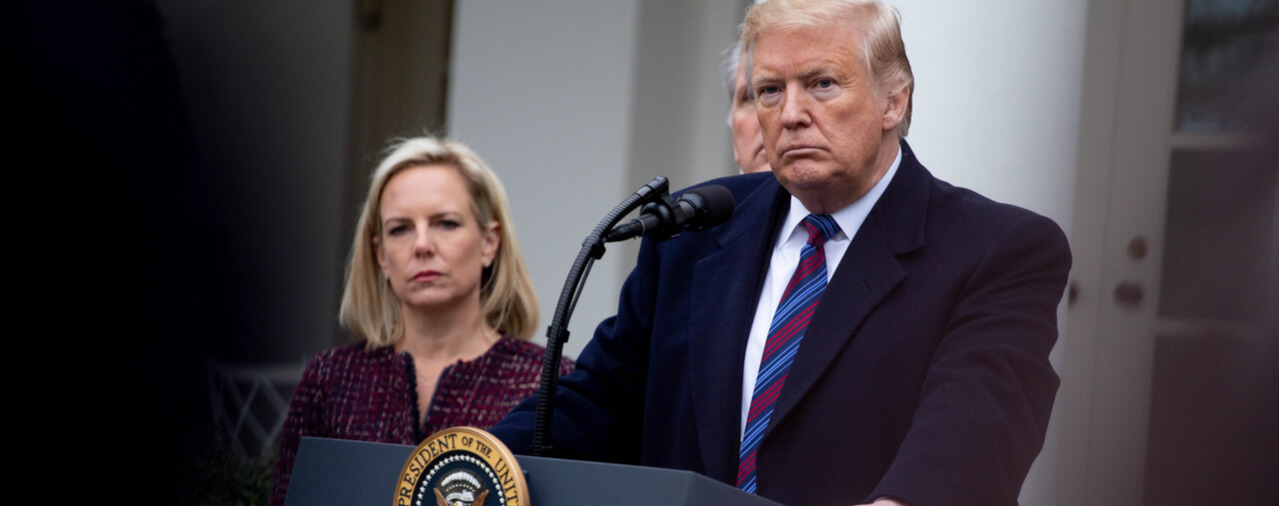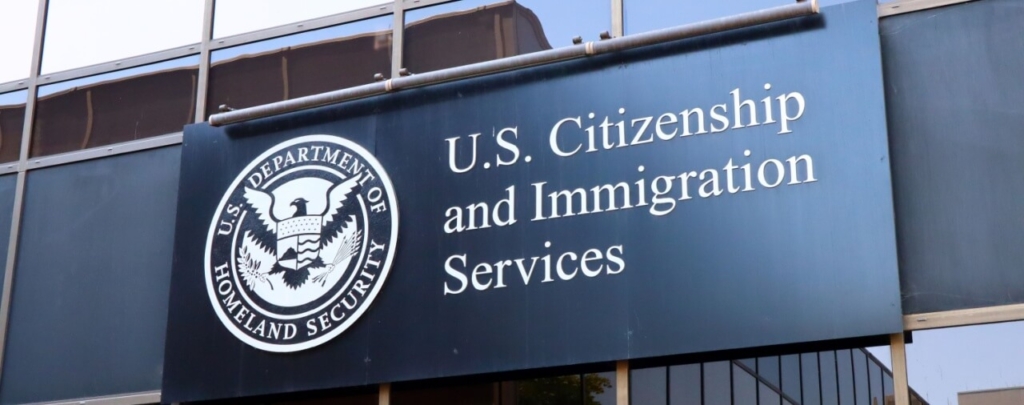- Introduction
- President Donald Trump
- Attorney General Jeff Sessions
- Acting Secretary of Homeland Security Elaine Duke
- Texas Attorney General Ken Paxton
- Speaker of the House Paul Ryan
- Senator Lindsey Graham
- Former President Barack Obama
- Conclusion
Introduction
On September 5, 2017, the Acting Secretary of Homeland Security, Elaine C. Duke, issued a memorandum rescinding the 2012 Deferred Action for Childhood Arrivals (DACA) memorandum, but also providing for a six-month wind-down of DACA. In our full article on the rescission of DACA, we discuss the background of the decision and how it will be implemented [see article]. In this supplementary post, we will examine statements from President Donald Trump, Attorney General Jeff Sessions, and Acting Secretary Duke on the decision. We will also examine a statement from Texas Attorney General Ken Paxton, whose lawsuit prompted the Trump Administration to make its decision, and from two key congressional leaders on what may happen next. Finally, we will also examine the critical response of former President Barack Obama.
President Donald Trump
See “Statement from President Donald J. Trump” [PDF version].
We have noted in numerous posts that President Trump has seemed conflicted about the DACA program. Although he campaigned on rescinding it, he had, for the first seven-plus months of his administration, declined to do so. Accordingly, at the top of his statement, he stated that although his highest duty is “to defend the American people and the Constitution,” he does not “favor punishing children … for the actions of their parents,” while also noting that most DACA recipients are now adults themselves.
In explaining his decision, President Trump noted that it is the job of the legislative branch, rather than the executive branch, to write the laws. He added that “this is the bedrock of our Constitutional system, which I took a solemn oath to preserve, protect, and defend.”
To that effect, President Trump criticized the decision of former President Barack Obama “to give work permits, social security numbers, and federal benefits to approximately 800,000 illegal immigrants currently between the ages of 15 and 36.” Describing DACA pejoratively as “executive amnesty,” he noted that Congress had, on several occasions, debated and declined to pass legislation that would have worked toward similar ends. He also noted that President Obama himself had taken the position that he did not have the authority to implement a program such as DACA before eventually doing so. President Trump described the decision to create DACA as “making an end-run around Congress and violating the core tenants that sustain our Republic.”
President Trump then discussed two additional reasons why he opted to end DACA. First, he referenced the pending litigation led by Texas. He noted that both Attorney General Sessions and other legal experts have advised him that the program is unlawful and unconstitutional and, accordingly, would not survive legal scrutiny.
Secondly, President Trump criticized the implementation on policy grounds in addition to legal grounds. He attributed the surge of unaccompanied minors that crossed the Southwest Border after the implementation of DACA in part to DACA.
President Trump took the position that “[t]here can be no path to principled immigration reform if the executive branch is able to rewrite or nullify federal laws at will.” Rather, he stated that “[o]nly the reliable enforcement of immigration law” can produce good results.
However, as we explained in detail in our full article on the rescission of DACA, President Trump did not end DACA completely as of September 5, 2017. Rather, DACA is being phased out in order to, in the words of the President, “provide a window of opportunity for Congress to finally act.”
Although DACA has been rescinded, President Trump emphasized that the DHS’s enforcement priorities “remain unchanged.” He stated that they are focused on “criminals, security threats, recent border-crosses, visa overstays, and repeat violators.” Accordingly, President Trump explained, he has advised the DHS that DACA recipients are not enforcement priorities unless they are criminals, otherwise involved in criminal activity, or gang members. Please see our full article to learn about the Trump Administration’s enforcement priorities [see article].
President Trump then moved on to criticize “[t]he decades-long failure of Washington D.C. to enforce federal immigration law,” which has, in his view, depressed wages, raised unemployment for American workers, and created other financial and law enforcement burdens. He stated that the interests of “American families, students, taxpayers, and jobseekers” must now come first. To this effect, President Trump reiterated his support for the RAISE Act proposal offered by Senators Tom Cotton and David Perdue, which we discussed in detail on site [see opinion blog].
Regarding DACA specifically, President Trump again pledged to solve the issues addressed by DACA “with heart and compassion.” He stated that reform must be done “through the lawful [d]emocratic process.” He added that any solution must “provide[] enduring benefits for the American citizens we were elected to serve.” He stated that “young Americans have dreams too…” and that the foremost obligation of any immigration reform “must be to improve jobs, wages[,] and security for American workers and their families.”
In typical rhetorical style, he concluded by stating that “[i]t is now time for Congress to act!”
Analysis
According to his statement, President Trump appears to have mostly based his decision to rescind DACA on a concern for the rule of law and our constitutional system of government, while noting his many concerns with the process and authorities utilized by the Obama Administration in implementing DACA. Neverthelesss, he had appeared reluctant to terminate DACA prior to ultimately doing so, and he acknowledged the imminent escalation of the pending legal challenges to DACA as something that ultimately motivated his decision.
Regarding what President Trump hopes to happen next, his statement leaves many questions open. First, President Trump explained that the six-month wind-down is intended to give Congress time to act. The fact that he on multiple occasions noted his compassion for DACA recipients suggests that he hopes to see a legislative solution providing similar benefits. However, he rejected an “amnesty first” approach to immigration reform, referencing DACA, suggesting that he had issues with the policy itself in addition to its implementation, while also making the goal of protecting American workers, as opposed to aliens in the United States illegally, the top priority.
President Trump also expressed these distinct goals in two tweets.
First, at 5:04 AM, prior to the official announcement:

Second, his account re-tweeted the following tweet from a different account:

Presumably, this all suggests that President Trump wants new provisions for immigration enforcement and border security to accompany any legislative solution for DACA recipients. However, it is unclear at this moment which sorts of provisions President Trump expects and how forceful he will be in pursuing them.
For interested readers, we have also uploaded the White House talking points on the decision [PDF version]. The talking points list various instances in which the Trump Administration alleges that former President Obama had initially opposed a DACA-like action on both legal and policy grounds before reversing course. It touts the accomplishments of the Trump Administration in immigration enforcement and takes the same position that President Trump did in his remarks by asserting that the DACA policy undercut immigration enforcements and American workers.
We will follow the situation and post updates on his thinking as they become available.
Attorney General Jeff Sessions
See “Attorney General Sessions Delivers Remarks on DACA” [PDF version].
Interestingly, while President Trump had ultimate decision-making authority over the future of DACA and the memorandum rescinding DACA was issued by Acting Secretary Elaine Duke, the announcement of the new policy was made by Attorney General Jeff Sessions. In his capacity as the head of the Department of Justice (DOJ), Sessions advised both President Trump and Acting Secretary Duke that DACA was illegal and that it would not survive legal scrutiny. Sessions had been an opponent of DACA on both legal and policy grounds when he was serving as a United States Senator from Alabama. Perhaps for these reasons, President Trump left it to Attorney General Sessions to deliver the news. The statement that we are reviewing is the remarks delivered by the Attorney General to the public. You may also watch the video of the remarks here:
Like President Trump, Attorney General Sessions focused on what he determined was the illegality of DACA. He noted that Congress had, on several occasions, refused to authorize the type of benefits legislatively that DACA did through executive action. He stated that “[s]uch an open-ended circumvention of immigration laws was an unconstitutional exercise of authority by the Executive Branch.”
Attorney General Sessions grounded the decision in deep concerns over the rule of law. More broadly than the immigration debate, Sessions stated that “[s]ocieties where the rule of law is subject to political whims and personal biases tend to become societies afflicted by corruption, poverty, and human suffering.” He stated further that “if we are to further our goal of strengthening the constitutional order and the rule of law in America, the Department of Justice cannot defend this type of overreach.”
Attorney General Sessions noted the legal challenges to DACA, and he suggested that it was unlawful for the same reasons that the United States District Court for the Southern District of Texas and the United States Court of Appeals for the Fifth Circuit enjoined the larger Deferred Action for Parents of Americans (DAPA) program. To this effect, Attorney General Sessions focused on separation of powers concerns regarding DACA. Interestingly, he did not address concerns regarding the president’s constitutional duty to ensure that the laws are faithfully executed, which was an additional ground on which Texas alleged that DAPA was illegal.
In addition to broader legal concerns, Attorney General Sessions addressed the immigration policy implications of DACA. He described DACA pejoratively as “unilateral executive amnesty,” and like President Trump he attributed the surge of unaccompanied minors crossing the Southwest Border in part to DACA. He also alleged that DACA had hindered the employment prospects of Americans. He added that “we cannot admit everyone who would like to come here. That is an open border policy and the American people have rightly rejected it.”
Attorney General Sessions addressed arguments that, regardless of legality, DACA was the right thing to do. He stated that, although “we are a people of compassion…” “there is nothing compassionate about the failure to enforce immigration laws.” Rather, he argued, the “compassionate thing to do is to end the lawlessness, enforce our laws, and, if Congress chooses to make changes to those laws, to do so through the process set forth by our Founders in a way that advances the interest of the nation.”
Attorney General Sessions struck a similar tone to President Trump while going into more specifics regarding his concerns that DACA had a negative effect on the rule of law and the constitutional order. He also touted the accomplishments of the Trump Administration on immigration enforcement and backed the RAISE Act. His remarks notably include fewer indications that his priority is replacing DACA benefits legislatively than President Trump expressed. However, Attorney General Sessions is unlikely to play a direct role in the debate over a legislative solution to DACA outside of any counsel on the subject that he may offer President Trump.
Please see our blog on the detailed legal rationale for rescinding DACA [see blog].
Acting Secretary of Homeland Security Elaine Duke
See “Statement from Acting Secretary Duke on the Recession of Deferred Action for Childhood Arrivals (DACA)” [PDF version].
Acting Secretary of Homeland Security Elaine Duke issued the memorandum rescinding DACA. Again, you may read our full article on the subject on site [see article].
Acting Secretary Duke stated that the decision to rescind DACA was not made lightly, but only after consultation with the DOJ. She stated that given the legal vulnerabilities of DACA, the Trump Administration had two options available to it:
1. Wind DACA down in an orderly fashion that protects beneficiaries in the near term while working with Congress to pass legislation; or
2. Allow the judiciary to potentially shut DACA down completely and immediately.
Acting Secretary Duke stated that the Trump Administration opted for the first option because it was the least destructive.
Acting Secretary Duke expressed her sympathy with DACA recipients who now face uncertain futures. She noted that DACA itself was never more than a temporary bureaucratic delay, and that it never promised a permanent solution for beneficiaries. For this reason, she stated, “DACA was fundamentally a lie.”
Acting Secretary Duke expressed her belief that former President Obama acted out of good intentions and his frustration with Congress. Nevertheless, she stated that a DHS memorandum, even if it is intended to be temporary, is not a substitute for a law passed by Congress and signed by the President.
Acting Secretary Duke explained that prior to assuming her current position, she taught civics to naturalization applicants. She noted that it was her position that “[t]he DACA program violates those basic civics lessons that are fundamental to our country and to our citizens.” She stated that, regardless of intent, “[i]t is dangerous precedent to systematically ignore the law…” Similarly to President Trump and Attorney General Sessions, Duke stated that “[i]t is dangerous to encourage and reward illegal immigration.”
Acting Secretary Duke encouraged Congress to come up with a legislative solution if it believes that the current immigration laws do not reflect the values of the United States. She stated that the DHS would cooperate with Congress in providing information to come up with such a solution. In her opinion, America is “overdue for real answers…” and there should be “[n]o more stopgap measures, no more temporary options, and no more kicking the tough decisions down the road in the hope they become too painful to ignore for someone else.”
Acting Secretary Duke’s statement expressed empathy for DACA recipients. However, like President Trump and Attorney General Sessions, she was harshly critical of the process under which DACA was implemented and the implications it had for constitutional governance, although granting that former President Obama may have been well-intentioned. Her statement seems to express stronger support for a permanent legislative replacement for DACA than articulated by Attorney General Sessions, although she too suggested that the process may have encouraged illegal immigration. In fact, in addition to legal concerns, a key theme of Acting Secretary Duke’s statement is that DACA was temporary and never provided a real solution for its beneficiaries.
Texas Attorney General Ken Paxton
See “AG Paxton Applauds President Trump’s Decision to Phase Out DACA” [PDF version].
The litigation led by Texas Attorney General Ken Paxton ultimately prompted President Trump to make a decision on the fate of DACA by September 5, 2017. Attorney General Paxton praised President Trump for phasing out DACA. He stated that leaving DACA in place “would have set a dangerous precedent by giving the executive branch sweeping authority to bypass Congress and change immigration laws.” Unlike Attorney General Sessions, Paxton also explicitly stated that DACA was “a violation of the President’s duty to ‘take Care that the Laws be faithfully executed…’”
Overall, the statement suggests that Texas will not pursue its case against DACA and DAPA further, notwithstanding the fact that the Trump Administration will allow a limited class of individuals to receive initial grants of DACA and DACA renewals subsequent to the rescission of DACA.
Speaker of the House Paul Ryan
See “Statement on DACA Program” [PDF version].
As Speaker of the House, Paul Ryan will play a leading role in the congressional debate over a legislative solution in the aftermath of the DACA rescission. Interestingly, although Speaker Ryan believes that DACA is illegal, he had encouraged President Trump to leave it in place while Congress assesses the issue.
Speaker Ryan’s sentiments echo those of Acting Secretary Duke. He suggested that while former President Obama may have been well-intentioned in implementing DACA, he abused his authority by “creat[ing] law out of thin air.” He added that DACA “was never a viable long-term solution…” to the problems it sought to address. He stated that it is Congress’s duty to write laws, and that President Trump’s decision “restore[d] the proper role of the executive and legislative branches.” In conclusion, he expressed his hope “that the House and Senate, with the president’s leadership, will be able to find consensus on a permanent legislative solution that includes ensuring that those who have done nothing wrong can still contribute as a valued part of this great country.”
Speaker Ryan’s statement strikes a softer tone than the statements of President Trump and his two secretaries. Although he stated that DACA was illegal, Speaker Ryan did not suggest that it had a negative effect on illegal immigration. In hoping for a solution, Speaker Ryan did not, as did President Trump and Attorney General Sessions, suggest that it would necessarily have to be accompanied by enforcement measures (although the language “legislative solution that includes” could be read this way). Speaker Ryan presides over a divided Republican caucus, so it remains to be seen how he will pursue crafting a solution that can pass both houses of congress.
Senator Lindsey Graham
See “Statement From U.S. Senator Lindsey Graham on DACA” [PDF version].
Senator Lindsey Graham of South Carolina has been the leading Republican proponent of a legislative solution to the issues purportedly addressed by DACA. We discussed his latest legislative proposal that preceded the DACA rescission in a detailed blog on site [see blog]. The following statement actually was made the day before the rescission when the decision appeared to be imminent.
Although Senator Graham is a leading supporter of Dream Act legislation, he expressed support for President Trump’s decision to cancel DACA and give Congress six months to craft a legislative solution. He stated that DACA was “presidential overreach.” He referenced the legislation that he recently co-sponsored and stated that he looked forward to working with both the Trump Administration and his colleagues to come up with a solution. Notably, Senator Graham has not suggested that he would insist on new immigration enforcement measures to accompany his proposal, although it remains to be seen if he will adopt such a position as the debate moves forward.
Former President Barack Obama
See “Barack Obama Statement” [PDF version]
Former President Barack Obama — whose administration implemented DACA — issued a harsh response to the decision of the Trump Administration. Although he is out of office, it is worth noting that the former President is still a highly influential figure in his party.
Obama stated that immigration is a complicated and heavily debated topic, and that those of good will can disagree on specific policies and fixes. However, he observed that the decision of the White House is not about fixing the immigration system or ensuring that everyone plays by the rules. He noted that “dreamers,” those protected by DACA, are “young people who grew up in America — kids who study in our schools, young adults who are starting careers, patriots who pledge allegiance to our flag.” He noted that these individuals are Americanized and many may not know a language other than English.
He explained that, as president, he asked Congress to send him a bill creating a permanent solution. When the bill never came, he concluded that it then made sense to “lift the shadow of deportation from these young people, so that they could continue to contribute to our communities and our country.”
Regarding allegations that the policy was illegal, Obama stated that it was “based on the well-established legal principle of prosecutorial discretion…” To this effect, he explained, the policy was legal and made sense on practical grounds due to the necessity of allocating limited resources. He suggested that it had a positive effect on immigration enforcement by allowing resources to be focused “on those who come illegally … to do us harm.”
Accordingly, the former president took the position that the rescission of DACA was not “required legally.” He opined instead that it was “a political decision, and a moral question.” He added that the decision was “cruel,” noting that many good people who came to the United States as children may end up subject to immigration enforcement.
Obama stated that now the responsibility has been shifted to Congress, it is incumbent on the legislature to devise a permanent legislative solution. He stated that the issue is ultimately about “basic decency” and “who we want to be.”
Former President Obama framed his disagreement with the DACA rescission in mostly moral terms, although he defended the action legally on grounds that it was a basic exercise of prosecutorial discretion and resource allocation. It is unclear whether he will take an active role in the forthcoming debate. However, given his influence as a two-term president who is still well-liked by the majority of Democrats in congress and across the country, it is quite likely that many will listen whenever he weighs in on the issue.
Conclusion
In this post, we examined a selection of statements from the Trump Administration, Congressional leaders, and former President Barack Obama. We will continue to follow the issue as it develops on site. Those who are unsure about their situation should consult with an experienced immigration attorney for guidance.





